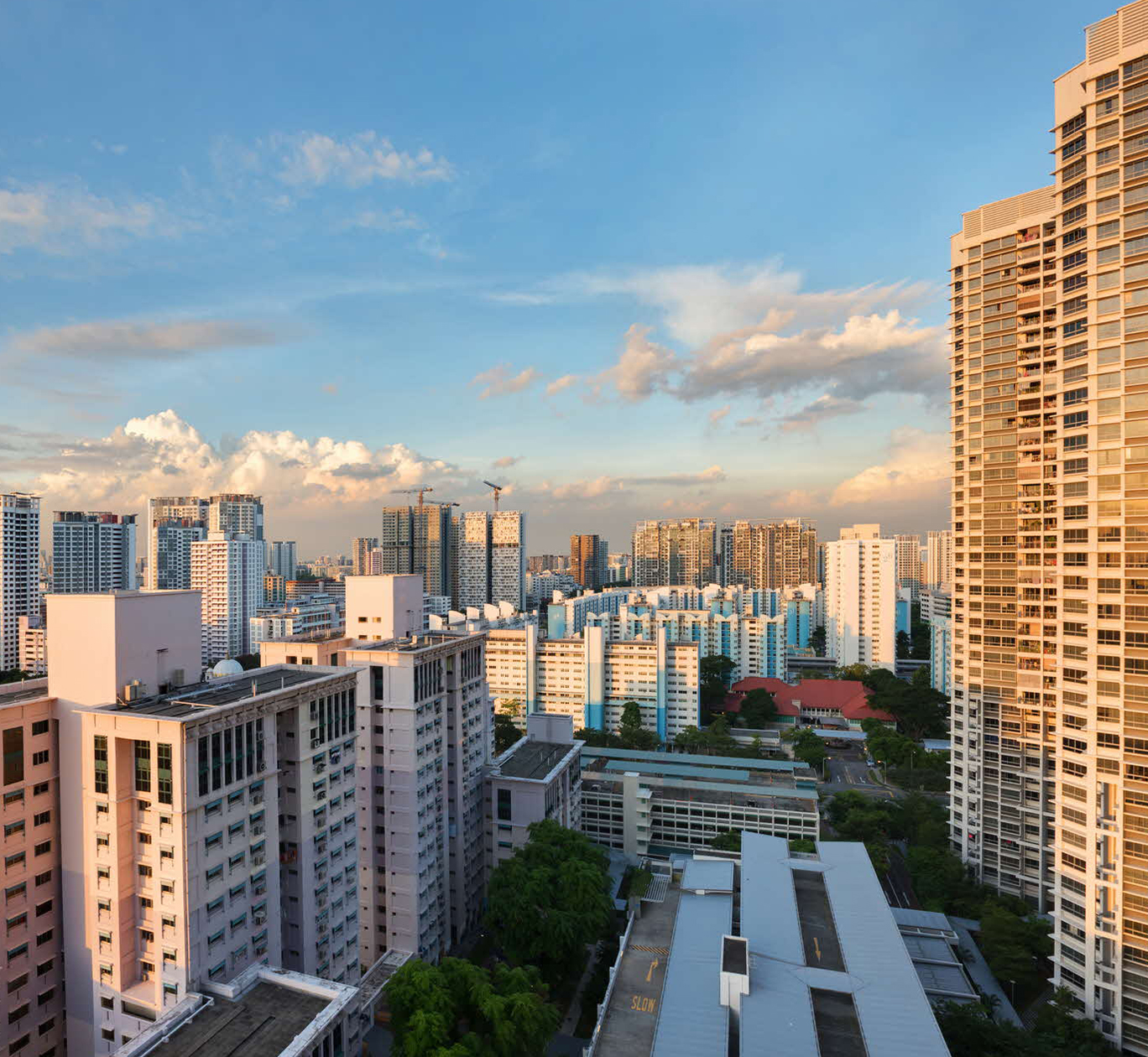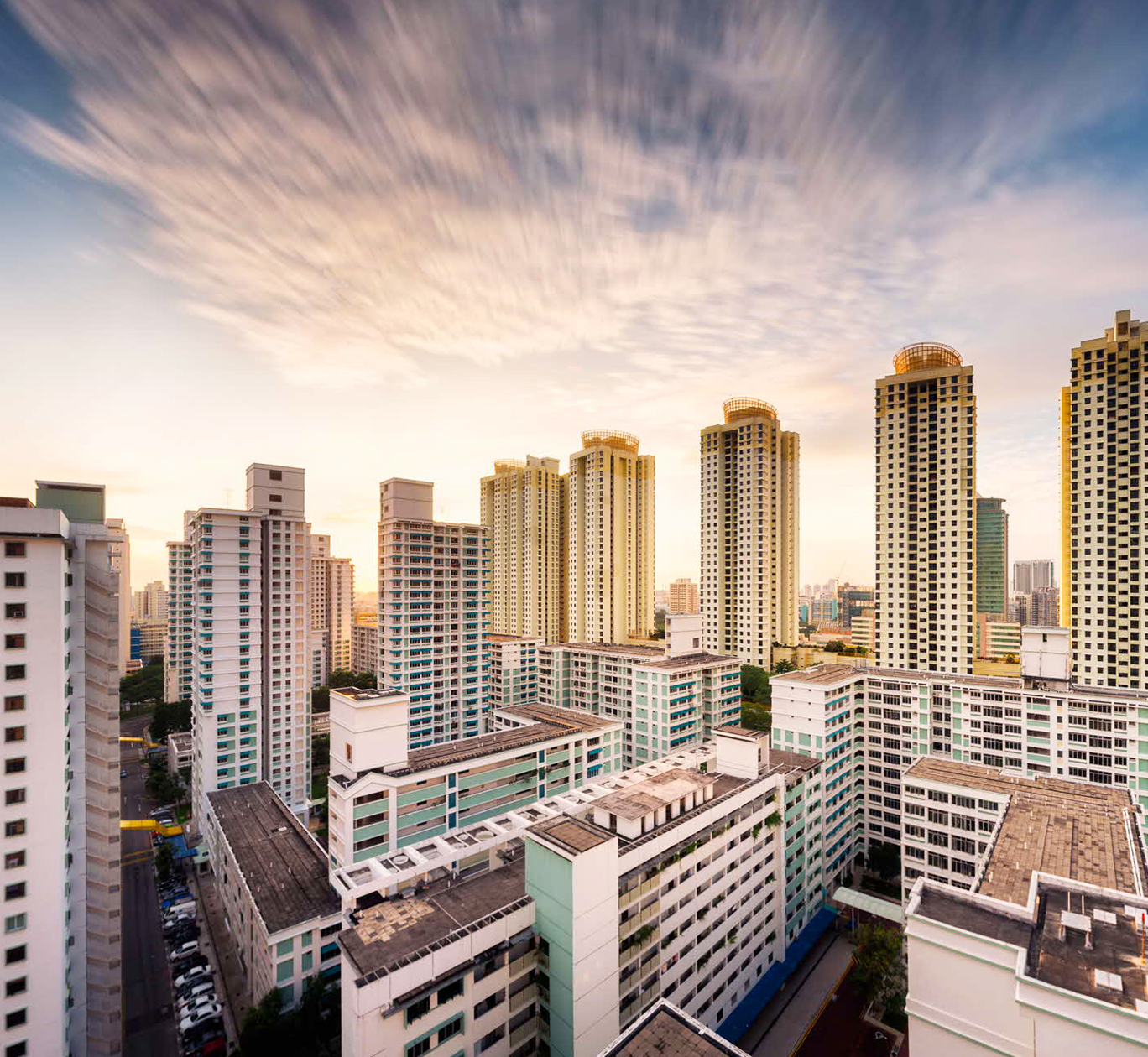How much to earn to buy a condo in SG?
![]()
If you’ve only got a minute:
- The median cost of buying a condominium in Singapore is S$1.5M. Other than the cost of a condominium, you’ll have to take the Buyer’s Stamp Duty (BSD) into account as well.
- You can borrow up to 75% of the property value from the bank and come up with the remaining 25% by cash or CPF. The maximum LTV of 75% is subject to a credit assessment.
- You will need to earn at least S$10,000 (after CPF deductions) to afford a condo comfortably. The monthly gross income of S$12,000 will be more manageable if it’s a joint purchase.
![]()
While the 5Cs no longer hold as much attraction for people in Singapore nowadays, owning or upgrading to a condominium is still a life goal held by many. After all, it’s a status symbol for many and private properties are assets that’ll appreciate in value through the years.
Given the skyrocketing property prices and rising mortgage loan interest rates, is it still an achievable goal?
The cost of owning a condo in Singapore
Housing in Singapore is generally expensive, especially when you move past public housing into private properties.
| Core Central Region (CCR) – (Districts 9, 10 and 11 and part of 1, 2, 4, 6 and 7) For example City, Downtown Core and Sentosa |
S$2,500,000 and up |
| Rest of Central Region (RCR) – (Districts 3, 8 and 12 and parts of 1, 2, 4, 5, 6, 7, 13, 14, 15 and 20) For example, Central areas that are not part of CCR: Chinatown, Geylang and Thomson. |
S$1,500,000 to S$3,000,000 |
| Outside Central Region (OCR) – Everywhere else in Singapore | S$900,000 to s$1,500,000 |
According to the market findings1, the median cost of buying a condominium in Singapore is at least S$1.5M in the RCR.
Besides the cost of the condo, you’ll have to take the Buyer’s Stamp Duty (BSD) into account as well.
The BSD is a property tax every individual in Singapore has to pay when they purchase a property.
| Buyer’s Stamp Duty Rates in Singapore | |
|---|---|
| First S$180,000 | 1% |
| Next S$180,000 | 2% |
| Next S$640,000 | 3% |
| Next S$500,000 | 4% |
| Next S$1,500,000 | 5% |
| Remaining Amount | 6% |
Note: BSD is rounded down to the nearest dollar, subject to a minimum duty of S$1.
In short, the total cost of purchasing a S$1.5M condominium in Singapore is S$1,544,600 (S$1,500,000 + S$1,800 + S$3,600 +S$19,200 + S$20,000), excluding miscellaneous fees.
Financing your condominium
Another important factor that determines whether you’re ready to purchase your first condo is the maximum amount of loan you can get to finance your purchase and your total out-of-pocket expenses.
Do note that you can only finance a condo using a bank loan in Singapore.
Downpayment and loan quantum
For bank loans, there is a Loan-To-Value (LTV) limit of 75%; meaning, you can borrow up to 75% of the property value from the bank and come up with the remaining 25% for downpayment. Do note, however, that the maximum LTV of 75% is subject to a credit assessment.
If you are eligible and want to take the maximum loan (75%), simply work out the sums for your downpayment and 75% loan quantum using the DBS home repayment calculator.
Keep in mind that at least 5% of the property price should be paid in cash, with the remaining portion of the downpayment to be paid in CPF and/or cash.
Monthly loan payment based on the maximum loan
For a S$1.5M property purchase, you can loan up to a maximum of S$1,125,500.
However, your total maximum home loan amount will be accessed based on your Total Debt Servicing Ratio (TDSR) limit – you may only use up to 55% of your monthly income to service your future monthly debt obligations. This amount keeps you within the LTV thresholds.
Assuming you have no other debts, (such as car loan, education loan and other personal loans across all banks), your estimated loan amount will be:
- Loan amount: S$1,125,500
- Medium-term interest rate: 4%, as advised by the Monetary Authority of Singapore (MAS)2
- Duration of home loan: 30 years
You will be required to pay S$4,744 – S$5,801 (based on indicative prevailing interest rates of 3% to 4.65%) every month.
| Monthly repayment for the first 5 Years | ||||
|---|---|---|---|---|
| Date | Interest rate | Beginning principal | Monthly instalment | Ending principal |
| 2024 | 4% | S$1,125,000 | S$5,371 | S$1,113,539 |
| 2025 | 4% | S$1,113,539 | S$5,371 | S$1,093,261 |
| 2026 | 4% | S$1,093,261 | S$5,371 | S$1,072,156 |
| 2027 | 4% | S$1,072,156 | S$5,371 | S$1,050,191 |
| 2028 | 4% | S$1,050,191 | S$5,371 | S$1,027,332 |
Note: Rates and computation are based on a 4% interest rate. This may differ from your actual home loan eligibility.
Based on the above figures, you will pay off your home loan by year 2054, with a total of S$808,529 in interest and S$1,125,000 in principal.
This is a conservative estimate and the situation might change over the years. For example, you could have refinanced to a home loan with better interest rates.
Check out DBS Repayment calculator to view the full breakdown.
What is the average salary needed to buy a condo
In order to maintain an average standard of living while meeting your monthly loan repayments of S$5,092, you will need to earn at least S$10,000 after CPF deductions.
In other words, you will need to earn a gross income of S$12,500 after factoring in the compulsory 20% CPF contribution.
This figure is definitely more attainable if you’re buying the property with a partner (each drawing at least S$6,000 salary per month).
The downpayment
Besides monthly repayments, you will need funds on hand to meet the downpayment as well.
| Here is a breakdown of the cost of buying a condominium worth S$1.5M: | ||
|---|---|---|
|
Total Cost |
S$1,544,601 |
|
|
Property Cost |
S$1,500,000 |
|
|
LTV Limit (75% & TDSR of 55%) |
S$1,125,000 |
|
|
Downpayment (25%) |
CPF or Cash (20%) |
S$300,000 |
|
Min. Cash Downpayment (5%) |
S$75,000 |
|
|
Stamp Duty (BSD) – CPF OA Payable on reimbursement basis |
S$44,601 |
|
Other than the minimum 5% cash payment of S$75,000, the remaining downpayment and BSD can be paid with your OA account.
Do take note, however, that the BSD will have to be paid in cash first and claimed from your OA after.
In short, you will require:
- Cash: S$119,601 (BSD + minimum cash downpayment)
- CPF OA: S$300,000 (if you do not have enough in your OA, you can supplement the shortfall with cash)
Important variables to consider
The ballpark figure of S$1.5M is the median price of condominium listings and may differ from the actual price of your property purchase. There are many condominium listings available across a wide range of prices depending on location and size.
For example, you’ll likely be able to find more affordable condo units in the OCR compared to the ones in the RCR. Among them, older condo units tend to be more affordable.
Your monthly household expenditure can definitely be reduced and a monthly gross income of S$12,000 will be more manageable if it’s an effort between 2 people.
The importance of financial planning
Financial planning allows you to realistically assess how much you can afford to spend on a property based on your current income, expenses, savings and financial goals (to prevent overextending yourself financially).
As buying a property requires significant upfront costs like downpayment and (for example, stamp duties, legal fee, settlement of cash over valuation, to name a few), proper planning ensures you have funds ready for these expenses.
In addition, owning a home comes with recurring expenses like mortgage payments, property taxes, insurance, maintenance, etc. With a financial plan in place, you will be able to plan for emergencies by creating a buffer for any unforeseen expenses.
In short, financial planning is crucial for determining if, when, and what you can afford when buying property according to your overall finances and lifestyle.
Do consider engaging a financial advisor or make use of online planning resources/tools to help navigate your property journey better.
Introducing DBS Home Marketplace
The DBS Home Marketplace is a portal set up by DBS bank to make the home planning journey stress-free.
Prospective and current homeowners can plan ahead easily when purchasing their dream property with the comprehensive suite of planning tools on the platform.
For example, you will be able to work out your property budget and get a detailed report on your home affordability with the tool. You also have the option to save the report with your digibank account, revisit and use it for future reference.
The tool can be used to generate a timeline of your cashflow and key home buying and selling milestones as well.
Whether you are buying your first home or looking to switch to your next home, the suite of DBS MyHome planning tools would be a great help.
A handy checklist for condo buyers
If you are purchasing your first property:
- Calculate the price of your dream condo (including BSD)
- Get an In-Principal Approval (IPA) – this will give you an idea of your estimated loan eligibility
- Secure an Option to Purchase (OTP)
- Check your finances for the upfront cash payments - e.g. cash and CPF available.
- Other fees and charges to consider - e.g. legal and valuation fees
- Decide on a bank and a suitable home loan
- Plan your post-purchase finances e.g. monthly mortgage repayments, MCST fees etc.
Make use of DBS MyHome’s Cashflow timeline to map out key milestone payments of your property purchase.
With proper planning, the quest to finding your dream condo can be a lot easier! Visit DBS Home Marketplace for more helpful resources and tools for your home purchase today!
Start Planning Now
Check out DBS Home Marketplace to work out the sums and find a home that meets your budget and preferences. The best part – it cuts out the guesswork.
Alternatively, prepare yourself with an In-Principle Approval (IPA), so you have certainty on how much you could borrow for your home, allowing you to know your budget accurately.
Sources:
1CNA, “IN FOCUS: With rising private home prices, is climbing the property ladder harder? “. Retrieved 11 Jun 2024.
CONDOLAUNCH, “What Is The Average Condo Price In Singapore?”. Retrieved 11 Jun 2024.
2 MAS, “Calculating TDSR for Property Loans”. Retrieved 11 Jun 2024.
Disclaimers and Important Notice
This article is meant for information only and should not be relied upon as financial advice. Before making any decision to buy, sell or hold any investment or insurance product, you should seek advice from a financial adviser regarding its suitability.








That's great to hear. Anything you'd like to add? (Optional)
We’re sorry to hear that. How can we do better? (Optional)